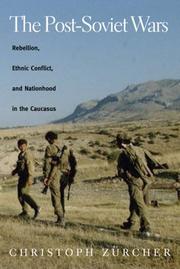| Listing 1 - 1 of 1 |
Sort by
|

ISBN: 9780814797099 0814797091 Year: 2007 Publisher: New York : New York University Press,
Abstract | Keywords | Export | Availability | Bookmark
 Loading...
Loading...Choose an application
- Reference Manager
- EndNote
- RefWorks (Direct export to RefWorks)
With his exciting narratives and compelling analysis of the twentieth century's Caucasian Wars,' Zrcher brings events on the periphery of Europe into the mainstream of social science and comparative politics. Disputing existing explanations of internal wars, he shows that rather than mountainous terrain or poverty, a more powerful causal explanation of civil bloodletting can be located in state capacities and the abilities of combatants to finance their struggles. This book is sure to stir debate. -Ronald Grigor Suny, University of MichiganDemocracy is commonly paired with order while ethnic violence is paired with strife and chaos. The Post-Soviet Wars painstakingly documents that both violence and stability have institutional reasons and must be organized politically by specific human agencies. This lesson is obviously relevant to the contemporary discussion of democratization as well as failing' states, let alone the effects wrought by the American war on terror. -Georgi Derlugyan, author of 'Bourdieu's Secret Admirer in the Caucasus: A World-System Biography' The Post-Soviet Wars is a comparative account of the organized violence in the Caucusus region, looking at four key areas: Chechnya, Armenia, Azerbaijan, Georgia, and Dagestan. Zrcher's goal is to understand the origin and nature of the violence in these regions, the response and suppression from the post-Soviet regime and the resulting outcomes, all with an eye toward understanding why some conflicts turned violent, whereas others not. Notably, in Dagestan actual violent conflict has not erupted, an exception of political stability for the region. The book provides a brief history of the region, particularly the collapse of the Soviet Union and the resulting changes that took place in the wake of this toppling. Zrcher carefully looks at the conditions within each region - economic, ethnic, religious, and political - to make sense of why some turned to violent conflict and some did not and what
Ethnic conflict --- Political violence --- Conflits ethniques --- Violence politique --- Case studies. --- Cas, Etudes de --- Caucasus --- Caucase --- Ethnic relations --- History --- Politics and government --- Relations interethniques --- Histoire --- Politique et gouvernement --- Political violenceCaucasus --- CaucasusEthnic relations
| Listing 1 - 1 of 1 |
Sort by
|

 Search
Search Feedback
Feedback About
About Help
Help News
News